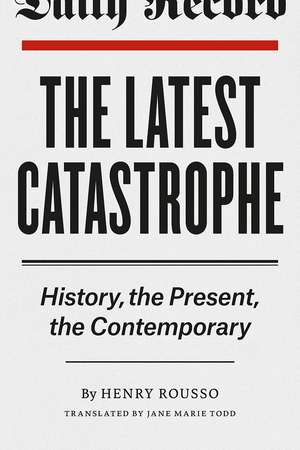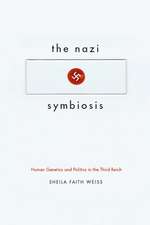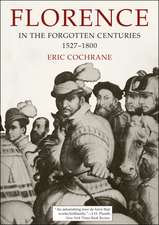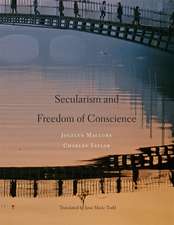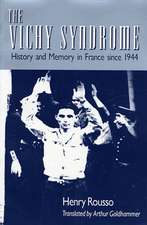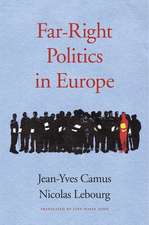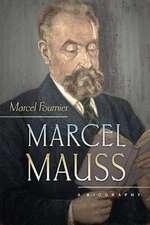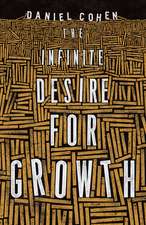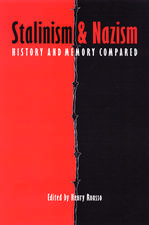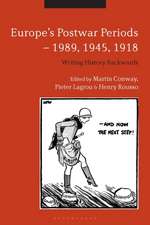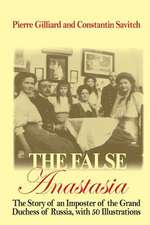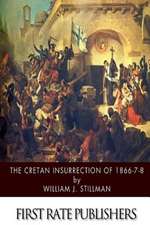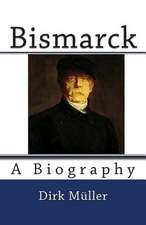The Latest Catastrophe: History, the Present, the Contemporary
Autor Henry Rousso Traducere de Jane Marie Todden Limba Engleză Paperback – 6 iul 2016
The writing of recent history tends to be deeply marked by conflict, by personal and collective struggles rooted in horrific traumas and bitter controversies. Frequently, today’s historians can find themselves researching the same events that they themselves lived through. This book reflects on the concept and practices of what is called “contemporary history,” a history of the present time, and identifies special tensions in the field between knowledge and experience, distance and proximity, and objectivity and subjectivity.
Henry Rousso addresses the rise of contemporary history and the relations of present-day societies to their past, especially their legacies of political violence. Focusing on France, Germany, the United Kingdom, and the United States, he shows that for contemporary historians, the recent past has become a problem to be solved. No longer unfolding as a series of traditions to be respected or a set of knowledge to be transmitted and built upon, history today is treated as a constant act of mourning or memory, an attempt to atone. Historians must also negotiate with strife within this field, as older scholars who may have lived through events clash with younger historians who also claim to understand the experiences. Ultimately, The Latest Catastrophe shows how historians, at times against their will, have themselves become actors in a history still being made.
Henry Rousso addresses the rise of contemporary history and the relations of present-day societies to their past, especially their legacies of political violence. Focusing on France, Germany, the United Kingdom, and the United States, he shows that for contemporary historians, the recent past has become a problem to be solved. No longer unfolding as a series of traditions to be respected or a set of knowledge to be transmitted and built upon, history today is treated as a constant act of mourning or memory, an attempt to atone. Historians must also negotiate with strife within this field, as older scholars who may have lived through events clash with younger historians who also claim to understand the experiences. Ultimately, The Latest Catastrophe shows how historians, at times against their will, have themselves become actors in a history still being made.
Preț: 214.61 lei
Nou
Puncte Express: 322
Preț estimativ în valută:
41.07€ • 44.75$ • 34.60£
41.07€ • 44.75$ • 34.60£
Carte disponibilă
Livrare economică 02-16 aprilie
Livrare express 18-22 martie pentru 23.05 lei
Preluare comenzi: 021 569.72.76
Specificații
ISBN-13: 9780226165233
ISBN-10: 022616523X
Pagini: 272
Dimensiuni: 152 x 229 x 18 mm
Greutate: 0.34 kg
Ediția:1
Editura: University of Chicago Press
Colecția University of Chicago Press
ISBN-10: 022616523X
Pagini: 272
Dimensiuni: 152 x 229 x 18 mm
Greutate: 0.34 kg
Ediția:1
Editura: University of Chicago Press
Colecția University of Chicago Press
Notă biografică
Henry Rousso is a senior researcher with the Institut d’histoire du temps présent at the Centre national de la recherche scientifique in Paris. He is the author or editor of many books, including The Vichy Syndrome: History and Memory in France since 1944. Jane Marie Todd is the translator of many books, including The Mountain: A Political History from the Enlightenment to the Present, also published by the University of Chicago Press.
Cuprins
Acknowledgments
Introduction “You Weren’t There!”
Chapter One Contemporaneity in the Past
Chapter Two War and the Time After
Chapter Three Contemporaneity at the Heart of Historicity
Chapter Four Our Time
Conclusion In the Face of the Tragic
Notes
Bibliography
Index
Introduction “You Weren’t There!”
Chapter One Contemporaneity in the Past
Chapter Two War and the Time After
Chapter Three Contemporaneity at the Heart of Historicity
Chapter Four Our Time
Conclusion In the Face of the Tragic
Notes
Bibliography
Index
Recenzii
“In a few short generations, contemporary history has moved from a peripheral to a dominant position in historical study. Yet until now there has not been a critical analysis of the particular difficulties and demands faced by historians of the recent past and the effects these have on the history they produce. As a historian of World War II and its memory, Rousso is acutely aware that catastrophes like war and genocide can lead societies to ask historians to address the past as though it has not passed. The Latest Catastrophe is an engaging and insightful work of great importance to historians of the recent past and to all those interested in the role the past and its analysis play in our culture today.”
“A provocative book! Highly recommended.”
"Rousso [is] a gifted and groundbreaking historian."
“The Latest Catastrophe is brilliant. It sheds light on the way we think about our own epoch in the wake of the catastrophic wars of the twentieth century and shows with elegance and sophistication how historians are constantly reworking in their practice the relationship between the present and the future.”
“A pioneer in the study of memory, Rousso interrogates the emergence in the twentieth century of the new field of contemporary history. Locating the roots of this concern in a series of catastrophic harms that threatened an earlier sense of identity and continuity with the past, Rousso takes us beyond memory and into the very nature of historical thought.”
“There is no better time than the present to be reading The Latest Catastrophe, no better historian than Rousso to introduce a concept by now so ubiquitous as to have escaped our consideration. In terms that are both philosophical and anecdotal, theoretical and emotionally charged, Rousso shows how the assumption of progress that once set the horizon for the writing of history has given way to a focus on the latest disaster. This is a profound meditation on the history of history that will find its place in the company of classic works by Marc Bloch, Tony Judt, and Paul Ricoeur.”
